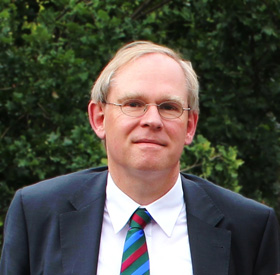Introducing New Staff 41
Self-introduction

WIERINGA, Edwin Paul
(Visiting professor, October 2015)
Since 2004, I am full Professor of Indonesian Philology with Special Reference to Islamic Cultures at the University of Cologne. In the 1980s, I started as a student of Asian history at the University of Leiden, but gradually and increasingly turned to philology and textual criticism of the languages of insular Southeast Asia at the University of Leiden, formally finishing my study with a MA thesis on traditional Malay historiography, which was published in 1990 as Carita Bangka; Het verhaal van Bangka. Tekstuitgave met introductie en addenda (Leiden: Rijksuniversiteit Leiden; Semaian 2). In 1994, I earned my PhD, also at Leiden University, which was awarded with the highest honours. My dissertation again shows my interest in historiography combined with philology, being a text edition and analysis of the traditional Javanese narrative poem Babad Bangun Tapa, which tells of the life-story of the Solonese king Pakubuwana VI who was banished to Ambon after the Java War in 1830.
As can be seen from my publications, my scholarly interests range widely. My most recent writings cover e.g. “A scholar’s claim on practical politics: Nūr al-Dīn al-Rānīrī’s seventeenth-century Malay Bustān al-Salāṭīn” in: Regula Forster and Neguin Yavari (eds.), Global medieval: mirrors for princes reconsidered (Boston, Mass.: Ilex Foundation; Harvard University Press, 2015), 151-173; six contributions to Annabel The Gallop (ed.), A Jawi sourcebook for the study of Malay palaeography and orthography, in: Indonesia and the Malay World 43,issue 125 (2015), and “The idea of an old Qur’an manuscript: On the commercialization of the Indonesian Islamic heritage” in: Heritage of Indonesia, International Journal of Religious Literature and Heritage 3 (2014), no. 1, 1-16.
In the framework of the Frankfurt Book Fair in October 2015, at which Indonesia was the Guest of Honour, I co-organized, together with Thoralf Hanstein, an exhibition of Indonesian manuscripts kept at the State Library in Berlin, accompanied by our lavishly illustrated bilingual (German-Indonesian) catalogue entitled Schrift Sprache. Aksara dan bahasa. Indonesische Handschriften der Staatsbibliothek zu Berlin Preußischer Kulturbesitz. Ausstellungskatalog (Berlin: Staatsbibliothek zu Berlin – Preußischer Kulturbesitz; Jakarta: Museum Nasional Indonesia). In September 2015, my translations of an anthology of Taufiq Ismail’s poems came out, viz. in Dutch, Debu di atas debu. Stof op stof. Kumpulan puisi dwi bahasa Indonesia-Belanda Taufiq Ismail (Jakarta: Majalah Sastra Horison), and in German (together with Carsten Beermann), Debu di atas debu. Staub auf Staub. Kumpulan puisi dwi bahasa Indonesia-Jerman Taufiq Ismail (Jakarta: Majalah Sastra Horison).
Since 2015, I take part in the international research project “Transformation of Religions as Reflected in Javanese Texts,” invited by its coordinator Assoc. Prof. Yumi Sugahara. My first visit to Japan was in February 2015, taking part in a conference at ILCAA-TUFS, in which I presented a paper on 19th-century Javanese court literature and the question of gender. From October 15, 2015 until 31 March, 2016, I am visiting special professor at ILCAA-TUFS with Prof. Koji Miyazaki as my host. During this period, my research will focus upon “Satan’s Sermon,” i.e. the Sĕrat Jiljalaha, a narrative poem in Javanese verse, which was composed sometime in the last quarter of the 19th century by a Yogyakarta palace official called Raden Riya Ranadiningrat (d. 1910). This text which is in the form of a sermon of the devil to his disciples makes use of religion-related ideas and ideals as “weapons” or “tools” in the social and political vocabulary of a particular historical period, viz. the era of high colonialism in Java.
Copyright © 2010 Research Institute for Languages and Cultures of Asia and Africa. All Rights Reserved.
